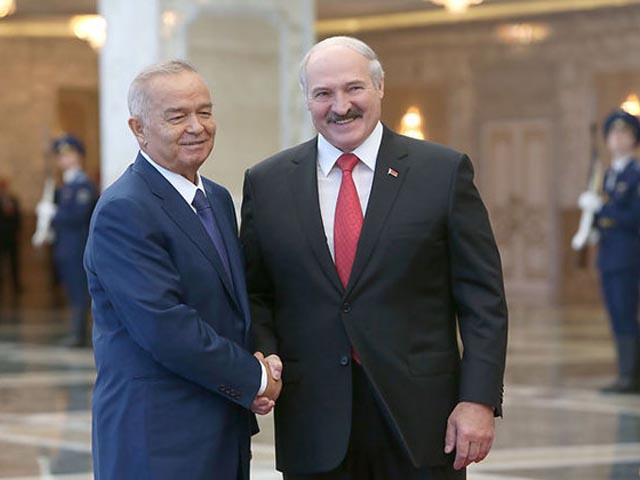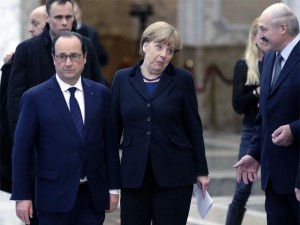Poland and Germany were both initiators and drivers of a New Eastern policy linked to the Eastern neighborhood and Russia/Soviet Union.
Andrei Yahorau: In authoritarian systems, a change of leader doesn’t mean a change of the regime

Lukashenko’s sudden leave will cause paralysis, possible chaos and struggle for power between the various groups.
The last days and hours of the life of the President of Uzbekistan Islam Karimov, are veiled in mystery. Obviously, there is violent struggle for presidency among the country’s powers.
What can be the consequences of the death of a dictator, who didn’t prepare a successor for himself? Is it by accident that the Uzbekistan situation is projected on modern Belarus? What conclusions should the official Minsk draw from that?
The director of the Center for European Transformation Andrei Yahorau answered these questions in the interview with the EuroBelarus Information Service.
— What are the political consequences of Islam Karimov’s death for Uzbekistan?
— The death of the leader in authoritarian systems always threatens the stability when the power is transited to a new leader. If earlier Karimov balanced different groups and clans in Uzbekistan, now the power struggle could lead to different scenarios: from the temporary loss of control over the country to the armed clashes between different groups and clans. This might be the most serious problem that Uzbekistan is now facing.
— But there is also an external factor: experts say that Russia will make every effort to put a pro-Russian politician at the head of Uzbekistan.
— This is not so easy. The system created by Karimov, is quite independent: Uzbekistan has been balancing between the different centers of geopolitical influence, including China, the US, and Russia. This means that the internal system was quite independent from Russia for Moscow to directly manipulate the internal situation. Uzbek system is very similar to Belarusan: it’s quite tough, centralized and controlled by the ruling elite, which is a large group of people that watches over Uzbekistan’s interests. Russia will try to put a pro-Russian politician at the head of Uzbekistan, but is unlikely to do so without the chaos that can follow after the collisions between different elite groups.
— Political longevity and lack of continuity of power is typical of all post-Soviet authoritarian regimes: Nursultan Nazarbaev has ruled Kazakhstan since 1990; his younger counterpart Lukashenko has been ruling Belarus since 1994. Some experts believe that the events in Uzbekistan can cause a domino effect. How likely is that?
— By itself, the Uzbek situation cannot cause a domino effect, because Karimov died a natural death.
However, we noticed another pattern: in post-Soviet dictatorships no transition to a more democratic regime happened. Thus, the change of a leader does not mean the change of regime.
— There is a big difference between Asian Uzbekistan and “European” Belarus. But the recent events in Uzbekistan are directly projected on Belarus. Could “the Uzbek situation” repeat in Belarus?
— It is yet unclear how the situation will be resolved in Uzbekistan.
But the sudden death of Lukashenko can cause temporary paralysis of power elites. It is dangerous for the country that Lukashenko’s sudden leave will cause paralysis, possible chaos and struggle for power between the various groups. In such situation, Russia’s intervention is more likely to happen. The Russian Federal Security Service has already calculated such options, and case of Lukashenko’s sudden death there are scenarios of how to prevent pro-Belarusan and pro-European forces from coming to power. In that case it will be quite difficult to resist Russia’s manipulative moves.
— Do you think that Russian scenario for Lukashenko's death has already been written?
— It certainly has. After the Revolution of dignity in Ukraine a lot of cases of corrupt high-ranking officials were revealed in political and military spheres. So why do we rule out that Russia may have this kind of contingent to manipulate the situation in Belarus through the attempts to destabilize the situation and creating chaos?
But it’s hard to say how deep Russia’s penetration into the power elites is.
Others
-
Uladzimir Matskevich: The sooner the "Union State" is denounced, the better for Belarus
Not only does the “Union State” undermine the establishment of civilized relations with Europe, but it hinders the possibility of normal relations between Belarus and Russia.
-
Uladzimir Matskevich: The regime can no longer control the situation in the country
The authorities are unable to prolong the social contract with the people: there is no way out of the social crisis.
-
Press release of the BNP in connection with the next round of the dialogue in the format of the EU-Belarus Coordination Group
Belarusan National Platform of the Eastern Partnership Civil Society Forum welcomes the dialogue process in the format of the EU-Belarus Coordination Group, the third round of which was held in Minsk on 3-4 April 2017.
-
Hennadiy Maksak: Europe must react adequately to the events in Minsk
A new wave of political repressions should make the EU return to tougher policy towards the Belarusan regime.








Comments
From farewell to a new Eastern policy and towards a new development
Poland and Germany were both initiators and drivers of a New Eastern policy linked to the Eastern neighborhood and Russia/Soviet Union.